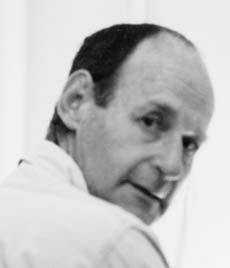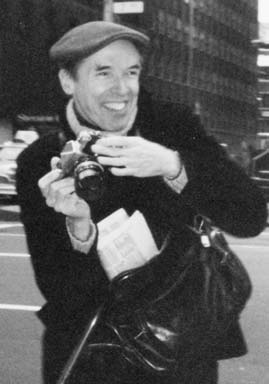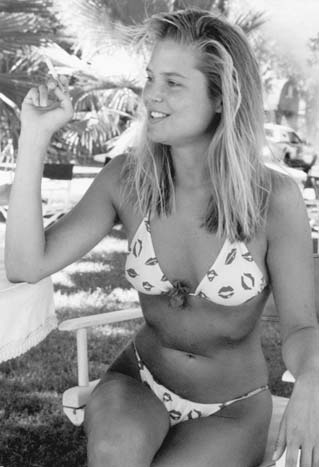No Lifeguard on Duty: The Accidental Life of the World's First Supermodel (23 page)
Read No Lifeguard on Duty: The Accidental Life of the World's First Supermodel Online
Authors: Janice Dickinson
Tags: #General, #Models (Persons) - United States, #Artists; Architects; Photographers, #Television Personalities - United States, #Models (Persons), #Entertainment & Performing Arts, #United States, #Dickinson; Janice, #Personal Memoirs, #Biography & Autobiography, #Biography, #Women

For the next few hours, Avedon worked his magic. I was in and out of a dozen outfits, one more beautiful than the next. Avedon directed the show with little fuss. His voice calm, a rock. I grew increasingly comfortable, increasingly confident. He urged me to
feel
the clothes against my skin, to forget I was in the studio, to imagine myself en route to the Academy Awards/on a hike in the Alps/at the beach—
depending, of course, on what I was wearing. And he was so goddamn gentle. If I went over the top, he’d ask me, in a whisper, to tone it down a little. And if I was too subdued, he’d urge me to give it a little punch. Avedon knew how to make a girl feel loved—you can see it in the pictures—and that’s no small part of his genius.
The result was a twelve-page spread in
Vogue.
The magazine was so happy with it that they booked me for a cover. With Irving Penn. Jesus! Did it never stop? Scavullo, Avedon, Penn. If Scavullo was the Genius and Avedon the Master, Penn was God.
I was
really
nervous about meeting Irving Penn. The thing is, not all that long ago, I’d been a little nobody, getting turned away, rudely, by these very people; now I was a sort of half-somebody from Wilhelmina. And it
was
fucking 168 J A N I C E D I C K I N S O N
scary. There’s no manual that tells you how to behave. And I didn’t come from the kind of family that teaches you much in the “class” department. But you wing it. And I decided I’d wing it. I cabbed over to the studio, on lower Fifth Avenue, took a deep, bracing breath, and rang the bell.
I was ushered inside by an assistant—I thought I recognized him as one of the smarmy little assholes who had turned me away when I was a nobody—and Penn came
over to say hello.
He had a huge studio. He must have had twenty underlings running around, getting ready for the shoot. Everyone was very quiet. It was almost sterile in there, like a hospital. Everything reflected his personality.
“Hello, Janice,” said the short little man approaching me. “I’m Irving Penn.”
We shook hands. He had small, soft hands. He reminded me of the Imp of Spring; a little munchkin. He was wearing a conservative coat and tie and he was polite and very soft-spoken. Old World to the core.
“Do you have any music?” I asked. There was a look on his face.
What?
“I have a hard time working without music.”
It was clear Penn preferred silence, but he humored me.
Before long, we were all listening to the
Rolling Stones.
I went over and jacked up the volume and watched as he prepared his equipment. He was very methodical. Calm.
Centered. His assistants did all the nervous scurrying for him. It was wonderful to watch. Penn ran the show with quiet grace.
Finally, when everything was ready, he nodded at two beefy guys who were standing in a corner. They looked like moving men. They ducked out back and returned
moments later with a huge hunk of ice on wheels, rolling it into position on a dolly. It was as big as a steamer trunk.

(((((((((((((((((((((
IRVING PENN:
ALWAYS INTIMIDATING,
ALWAYS A GENIUS.
Penn came over and stood me in
front of the giant ice cube. I was practically sitting on it. He shot and shot some more, and moved me this way.
Gorgeous, wonderful, let’s have a smile, please.
I loved watching him work. Like Avedon, he was all
about control, all about making the perfect image. These men predated idiot-proof cameras; this was before autofocus, autolights, autoinspiration. This was before the Almighty Digital Image. These men were artists in the truest sense of the word.
By the time we took our first break, my butt was freezing. I went over and parked it next to the radiator.
“What are you doing, Miss Dickinson?” Penn asked.
“I’m warming up your dinner, Mr. Penn.”
A couple of assistants looked over at me in horror. But Penn just smiled.
“You’re quite something, Miss Dickinson,” he said.
“So are you, Mr. Penn.”
Three weeks later, he called me back for another shoot.
He took me out to Jones Beach with Patti Hansen and Shawn Casey, and we modeled bathing suits all afternoon.
Penn seldom left the studio, so it was quite the big deal. His twenty assistants looked nervous and out of their element on the sand. But not Penn; he was quiet, commanding, relaxed. He was the opposite of Reinhardt and that ilk; there was no shouting, no ego, just a steady, calming presence.
At one point, all three of us were lying on the sand in red, one-piece bathing suits, so close we were almost touching. “I used to do this in South Florida,” I told Patti, remembering how I would lie on the beaches, on

170 J A N I C E D I C K I N S O N
Quaaludes, dreaming of becoming a famous model. “I
can’t believe I’m getting paid for it.”
Between shots, I asked Penn questions about natural light and reflected light. He was incredibly generous about it.
I got home that night and told Mike how much I’d
learned from Penn in the course of a single day. I was wired; I couldn’t wait to whip out my cameras and put Penn’s lessons to work. Mike didn’t say anything. He just looked at me and laughed a nasty, disparaging laugh. For a moment, I saw my father’s face in his. I was livid. I stormed out and went downstairs to see Bill Cunningham, a
New York Times
fashion photographer and one of my all-time favorite neighbors.
“Fucking French Mafia,” he said. “They’re a bunch of pretentious amateurs—and that goes double for Mike Reinhardt!” I felt better instantly.
Bill only shot with Leicas. And he never went anywhere without his velvet beret. I used to go to visit him with my contact sheets and we’d pore over them with a loupe and he’d give me pointers.
This shot
has no depth. This one is poorly
centered. This one makes me
feel claustrophobic.
He’d tell
me how to fill the frame. He
advised me to get right into
people’s faces. He told me to
keep working on my style.
“What style?” I asked. “I
didn’t know I had a style.”
“It’s getting there,” he said,
BILL CUNNINGHAM
ªªªªªªªªªªªªªªªªªªª
N O L I F E G UA R D O N D U T Y 171
showing me. “There’s something casual and edgy about your shots. And a little rough, like photojournalism. I like it. Stay on track.”
On my twenty-second birthday, Bill gave me a photograph of Greta Garbo. It was one of those paparazzi-style shots: the reclusive Garbo glaring at the lens, her eyes awash in venom. I loved it, still have it today. And, no, it’s not for sale.
But Bill gave me something much more valuable than a photograph and his undying friendship: He gave me confidence in myself as a photographer.
ªªªªªªªªªªªªªªªªªªªªªªªªªªªªª
At around this time I started working with one of the handsomest men in the business: Calvin Klein. He was wonderful. He talked to me about my ongoing battles with Mike, about life love drugs self-esteem and the crazy business that ran our lives.
Whenever I had a moment alone, a moment to think, I felt depressed. I wasn’t in love with Mike anymore; I wasn’t sure I’d ever been in love with him. I didn’t feel good about it, either. Or about myself. Sure, I felt beautiful.
People made a living telling me how beautiful I was. But that didn’t do much for me on the inside. And nobody was asking.
“So I guess they don’t give a shit, right?” I asked Calvin.
“Of course they don’t give a shit,” he said. “This business is about surfaces. People don’t care to dig too deeply.
They’d rather not know.”
So who was I? A successful supermodel? Mike Reinhardt’s doormat? The frightened little girl who wouldn’t suck her father off?
“Janice,” Calvin joked. “Models aren’t supposed to
think.
”
He was right. Models are supposed to be dumb, right?
That’s what they tell us, anyway. And, yes, there are plenty of pretty girls who are thick as posts. But most of us can N O L I F E G UA R D O N D U T Y 173
actually walk and talk and snort coke at the same time.
And some of us even ask ourselves Big Questions, like,
What the fuck does it all mean?
Christ, this
thinking
—it was exhausting. I needed help.
I called my old friend Alexandra King—the one with
the foul-mouthed parrot—and got the name of a respected Upper East Side shrink. I went to see him. He was in his mid-forties, good-looking in a blandish sort of way. With his round glasses and graying temples, he reminded me of an owl.
I gave him my life story in about ten minutes. He nodded from time to time, but his expression never changed. I thought maybe he was thinking about fucking me, but I was wrong. He was actually paying attention.
“A great deal of what happened to us in the past
searches for expression in the present,” he said when I was done. “Every relationship contains within it the ghosts of everything that
wasn’t.
” Huh? Okay, I’m a model. Slow down.
I wish I’d brought a tape recorder, because everything he said was brilliant. And of course I never put any of it into practice. But this is basically what I remember—and I know I’m not doing him justice.
All of us are fucked up, he said. Some worse than others. And much of what happened to us as kids, well—we want to fix it. No matter how many years have passed, we’re determined to fix it. So what we do, see, is we keep getting into relationships that mirror the relationships we had with our parents. And the reason we do is that we want to undo the damage by reexperiencing it and finally getting it right.
So, yeah, what he was saying was that Mike Reinhardt was the latest version of my own personal Lost Ark: my abusive father. And, in some ways, I think I saw what he

174 J A N I C E D I C K I N S O N
meant. Like my father, Mike made me feel I would never amount to anything. He would put me down at every turn.
He would criticize the way I spoke, walked, talk, ate. And if I tried to do anything on my own—take pictures, for example—Mike was quick to put me down for it.
“The psychiatric term for this is ‘repetition compulsion,’ ” the wise old owl was saying. “People spend the bulk of their lives recapitulating old conflicts, trying to undo the damage that was inflicted on them as children.
But most of them never break free of it.”
Well, thanks a lot!
Never break free of it.
That’s really fucking heartwarming.
I walked the thirty blocks to Carnegie Hall, trying to understand what he was telling me. What did I want from Mike? Was I really looking for men who would mistreat me? No—that was insane. (Was
I
insane?) And this business about history repeating itself—surely there was
some way to avoid that, no?
I mean, if I actually understood what I was doing,
why couldn’t I just stop
doing it? But what
was
I doing exactly? I just
wanted
to be wanted.
That’s all.